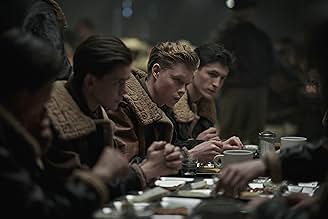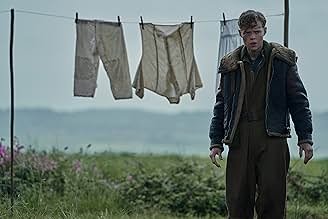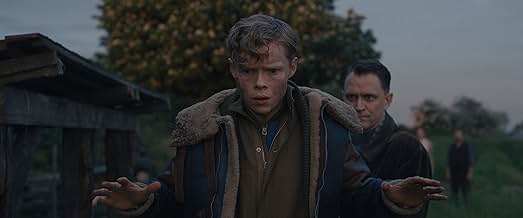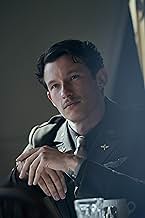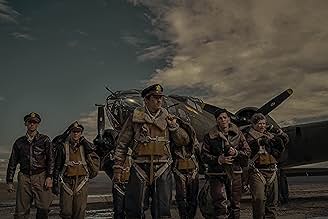Cinque miglia sopra la terra e dietro le linee nemiche, undici uomini all'interno di un bombardiere conosciuto come "Fortezza Volante" combattono contro stormi di combattenti tedeschi.Cinque miglia sopra la terra e dietro le linee nemiche, undici uomini all'interno di un bombardiere conosciuto come "Fortezza Volante" combattono contro stormi di combattenti tedeschi.Cinque miglia sopra la terra e dietro le linee nemiche, undici uomini all'interno di un bombardiere conosciuto come "Fortezza Volante" combattono contro stormi di combattenti tedeschi.
- Vincitore di 1 Primetime Emmy
- 4 vittorie e 13 candidature totali
Sfoglia gli episodi
Trama
Lo sapevi?
- QuizFlight scenes were filmed in replica B-17s using technology known as The Volume (used on The Mandalorian (2019)). The B-17s were suspended 50 ft in the air on a gimbal inside a 360-degree stage of seamless LED panel screens and ceiling. Actors could therefore react to flak explosions, crashes and planes flying in real time as the gimbal simultaneously reacted to scenarios.
- BlooperThroughout the series the standard B-17F version is shown, but by early 1944 nearly all B-17s in the European Theatre had been upgraded to the B-17G version with the distinctive powered twin nose turret to help combat frontal assaults by the Luftwaffe.
- ConnessioniFeatured in WatchMojo: Top 10 TV Shows of 2024 (So Far) (2024)
Recensione in evidenza
Masters of the Air is a gripping and intense exploration of the air campaigns conducted by the Air Force during World War II. The series, a continuation of the tradition set by Band of Brothers and The Pacific, delves into the lives of the bomber crews who played a crucial role in the Allied victory over Nazi Germany. Across its episodes, the series captures the brutality of war, the camaraderie of men in battle, and the profound psychological effects of conflict. With its focus on air warfare, Masters of the Air offers a different perspective on World War II, illuminating the often-overlooked contributions and sacrifices of bomber pilots and crews.
One of the most compelling aspects of the series is its focus on the human experience of war. While the action sequences are breathtaking and provide a visceral representation of air combat, it is the intimate portrayal of the men aboard the bombers that elevates the series. The characters are given depth and complexity, with the series taking the time to explore their motivations, fears, and struggles. Whether it's the tension before a mission, the relief of survival, or the guilt of witnessing fellow airmen perish, the emotional weight of the show is palpable. The relationships between the men are at the heart of the story, and the series does an excellent job of portraying the bond formed by shared trauma.
From a thematic standpoint, Masters of the Air explores several important issues, including the dehumanizing effects of war, the fine line between heroism and survival, and the moral dilemmas faced by soldiers. One of the most striking themes is the psychological toll of the bombing campaigns. The men are tasked with delivering death and destruction from above, often targeting civilians. The series doesn't shy away from depicting the ethical ambiguity of their actions, and many of the characters struggle with the morality of their missions. This exploration of guilt and responsibility adds layers of complexity to the series, reminding viewers that even those who fight on the right side of history are not immune to the moral consequences of their actions.
The series excels in its technical execution, with the direction and cinematography capturing both the grandeur and horror of the air battles. The aerial combat sequences are breathtaking, filled with stunning visuals of bomber formations, enemy fighters, and the chaos of anti-aircraft fire. The use of CGI is impressive and realistic, enhancing the immersive experience of the air combat without distracting from the human drama. The production design and attention to historical detail are also remarkable, with the bombers, uniforms, and settings all meticulously recreated to provide an authentic period feel. The sound design is another standout element, with the roar of engines and the thunder of explosions providing a visceral sense of the danger these men faced.
Despite its many strengths, Masters of the Air is not without its flaws. One of the series' challenges is maintaining a consistent narrative momentum. The episodic structure, while allowing for character development, sometimes leads to pacing issues. Some episodes focus heavily on the action, while others slow down to explore the emotional aftermath of combat. This imbalance can make the series feel uneven at times, as the shifts in tone and focus occasionally disrupt the narrative flow. Additionally, while the show does an admirable job of fleshing out its main characters, some of the secondary characters feel underdeveloped, leaving certain relationships and subplots feeling incomplete.
The performances in the series are outstanding, with the cast delivering powerful portrayals of men under extreme pressure. The actors bring nuance to their roles, skillfully portraying the psychological toll of war. The lead performances stand out, particularly in moments of quiet reflection or emotional breakdown. The show's ability to balance large-scale action with intimate, character-driven moments is one of its greatest strengths, and much of that credit goes to the actors. Their portrayals of camaraderie, fear, and resilience feel authentic and deeply moving, grounding the series' epic scope in personal stories.
The editing and pacing of Masters of the Air are generally well-executed, although, as previously mentioned, some episodes struggle with pacing. The moments of tension during combat are perfectly timed, with the editing building suspense and intensity. However, the quieter, reflective scenes are occasionally drawn out, which can slow the overall rhythm of the show. That said, the slower moments are often necessary to give the characters room to breathe and for the audience to process the emotional gravity of the story. The series strikes a delicate balance between action and introspection, though not always perfectly.
One of the most impactful elements of Masters of the Air is its focus on the theme of survival. Unlike many war series that celebrate victory and heroism, this show emphasizes the arbitrary nature of survival in war. Men live or die based on luck as much as skill, and the randomness of death is a constant undercurrent throughout the series. This existential theme adds to the emotional weight of the show, as viewers are reminded that every successful mission comes at a high cost, and every surviving soldier carries the burden of those who did not make it back.
In terms of historical importance, Masters of the Air succeeds in shedding light on a crucial but often overlooked aspect of World War II. While ground combat is frequently depicted in films and series, the air war over Europe is less often explored. This series does an excellent job of illustrating the strategic significance of the air campaigns, as well as the personal cost borne by the men who flew the missions. The show also touches on the broader societal impact of the war, particularly the psychological scars left on the soldiers and their difficulty reintegrating into civilian life after the conflict.
In conclusion, Masters of the Air is a powerful and thought-provoking war drama that captures the bravery, trauma, and complexity of the air campaigns during World War II. The series excels in its performances, direction, and technical execution, offering a visually stunning and emotionally resonant portrayal of war. While it has some pacing issues and occasionally struggles to maintain narrative momentum, the series' strengths far outweigh its weaknesses. It stands as a fitting tribute to the men of the Eighth Air Force, highlighting their courage while also acknowledging the psychological toll of their service. In the broader landscape of war series, Masters of the Air holds a significant place, contributing to a deeper understanding of the human experience of war.
One of the most compelling aspects of the series is its focus on the human experience of war. While the action sequences are breathtaking and provide a visceral representation of air combat, it is the intimate portrayal of the men aboard the bombers that elevates the series. The characters are given depth and complexity, with the series taking the time to explore their motivations, fears, and struggles. Whether it's the tension before a mission, the relief of survival, or the guilt of witnessing fellow airmen perish, the emotional weight of the show is palpable. The relationships between the men are at the heart of the story, and the series does an excellent job of portraying the bond formed by shared trauma.
From a thematic standpoint, Masters of the Air explores several important issues, including the dehumanizing effects of war, the fine line between heroism and survival, and the moral dilemmas faced by soldiers. One of the most striking themes is the psychological toll of the bombing campaigns. The men are tasked with delivering death and destruction from above, often targeting civilians. The series doesn't shy away from depicting the ethical ambiguity of their actions, and many of the characters struggle with the morality of their missions. This exploration of guilt and responsibility adds layers of complexity to the series, reminding viewers that even those who fight on the right side of history are not immune to the moral consequences of their actions.
The series excels in its technical execution, with the direction and cinematography capturing both the grandeur and horror of the air battles. The aerial combat sequences are breathtaking, filled with stunning visuals of bomber formations, enemy fighters, and the chaos of anti-aircraft fire. The use of CGI is impressive and realistic, enhancing the immersive experience of the air combat without distracting from the human drama. The production design and attention to historical detail are also remarkable, with the bombers, uniforms, and settings all meticulously recreated to provide an authentic period feel. The sound design is another standout element, with the roar of engines and the thunder of explosions providing a visceral sense of the danger these men faced.
Despite its many strengths, Masters of the Air is not without its flaws. One of the series' challenges is maintaining a consistent narrative momentum. The episodic structure, while allowing for character development, sometimes leads to pacing issues. Some episodes focus heavily on the action, while others slow down to explore the emotional aftermath of combat. This imbalance can make the series feel uneven at times, as the shifts in tone and focus occasionally disrupt the narrative flow. Additionally, while the show does an admirable job of fleshing out its main characters, some of the secondary characters feel underdeveloped, leaving certain relationships and subplots feeling incomplete.
The performances in the series are outstanding, with the cast delivering powerful portrayals of men under extreme pressure. The actors bring nuance to their roles, skillfully portraying the psychological toll of war. The lead performances stand out, particularly in moments of quiet reflection or emotional breakdown. The show's ability to balance large-scale action with intimate, character-driven moments is one of its greatest strengths, and much of that credit goes to the actors. Their portrayals of camaraderie, fear, and resilience feel authentic and deeply moving, grounding the series' epic scope in personal stories.
The editing and pacing of Masters of the Air are generally well-executed, although, as previously mentioned, some episodes struggle with pacing. The moments of tension during combat are perfectly timed, with the editing building suspense and intensity. However, the quieter, reflective scenes are occasionally drawn out, which can slow the overall rhythm of the show. That said, the slower moments are often necessary to give the characters room to breathe and for the audience to process the emotional gravity of the story. The series strikes a delicate balance between action and introspection, though not always perfectly.
One of the most impactful elements of Masters of the Air is its focus on the theme of survival. Unlike many war series that celebrate victory and heroism, this show emphasizes the arbitrary nature of survival in war. Men live or die based on luck as much as skill, and the randomness of death is a constant undercurrent throughout the series. This existential theme adds to the emotional weight of the show, as viewers are reminded that every successful mission comes at a high cost, and every surviving soldier carries the burden of those who did not make it back.
In terms of historical importance, Masters of the Air succeeds in shedding light on a crucial but often overlooked aspect of World War II. While ground combat is frequently depicted in films and series, the air war over Europe is less often explored. This series does an excellent job of illustrating the strategic significance of the air campaigns, as well as the personal cost borne by the men who flew the missions. The show also touches on the broader societal impact of the war, particularly the psychological scars left on the soldiers and their difficulty reintegrating into civilian life after the conflict.
In conclusion, Masters of the Air is a powerful and thought-provoking war drama that captures the bravery, trauma, and complexity of the air campaigns during World War II. The series excels in its performances, direction, and technical execution, offering a visually stunning and emotionally resonant portrayal of war. While it has some pacing issues and occasionally struggles to maintain narrative momentum, the series' strengths far outweigh its weaknesses. It stands as a fitting tribute to the men of the Eighth Air Force, highlighting their courage while also acknowledging the psychological toll of their service. In the broader landscape of war series, Masters of the Air holds a significant place, contributing to a deeper understanding of the human experience of war.
- fernandoschiavi
- 18 ott 2024
- Permalink
I più visti
Accedi per valutare e creare un elenco di titoli salvati per ottenere consigli personalizzati
IMDb's 2024 TV Guide
IMDb's 2024 TV Guide
See our rundown of "Yellowstone" Season 5, Part 2, "Squid Game" Season 2, and more of the most anticipated new and returning series coming to TV and streaming.
- How many seasons does Masters of the Air have?Powered by Alexa
Dettagli
- Data di uscita
- Paese di origine
- Lingua
- Celebre anche come
- Bá Chủ Bầu Trời
- Luoghi delle riprese
- Aziende produttrici
- Vedi altri crediti dell’azienda su IMDbPro
- Tempo di esecuzione56 minuti
- Colore
- Mix di suoni
- Proporzioni
- 2.39:1
Contribuisci a questa pagina
Suggerisci una modifica o aggiungi i contenuti mancanti

Divario superiore
What was the official certification given to Masters of the Air (2024) in Germany?
Rispondi






